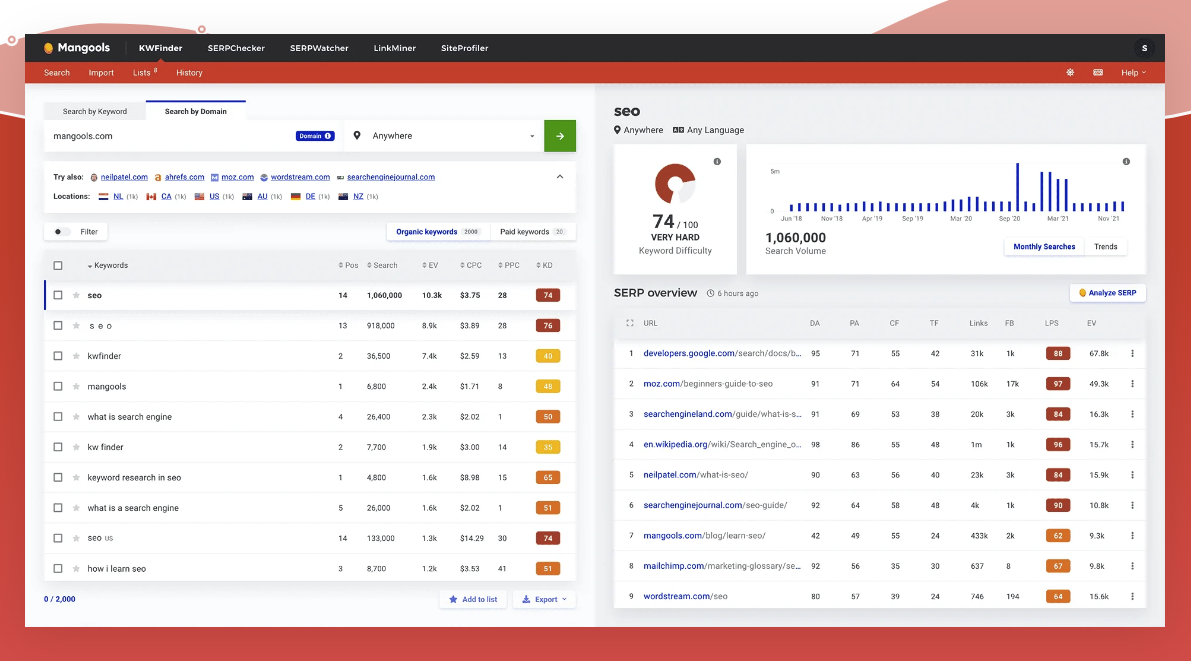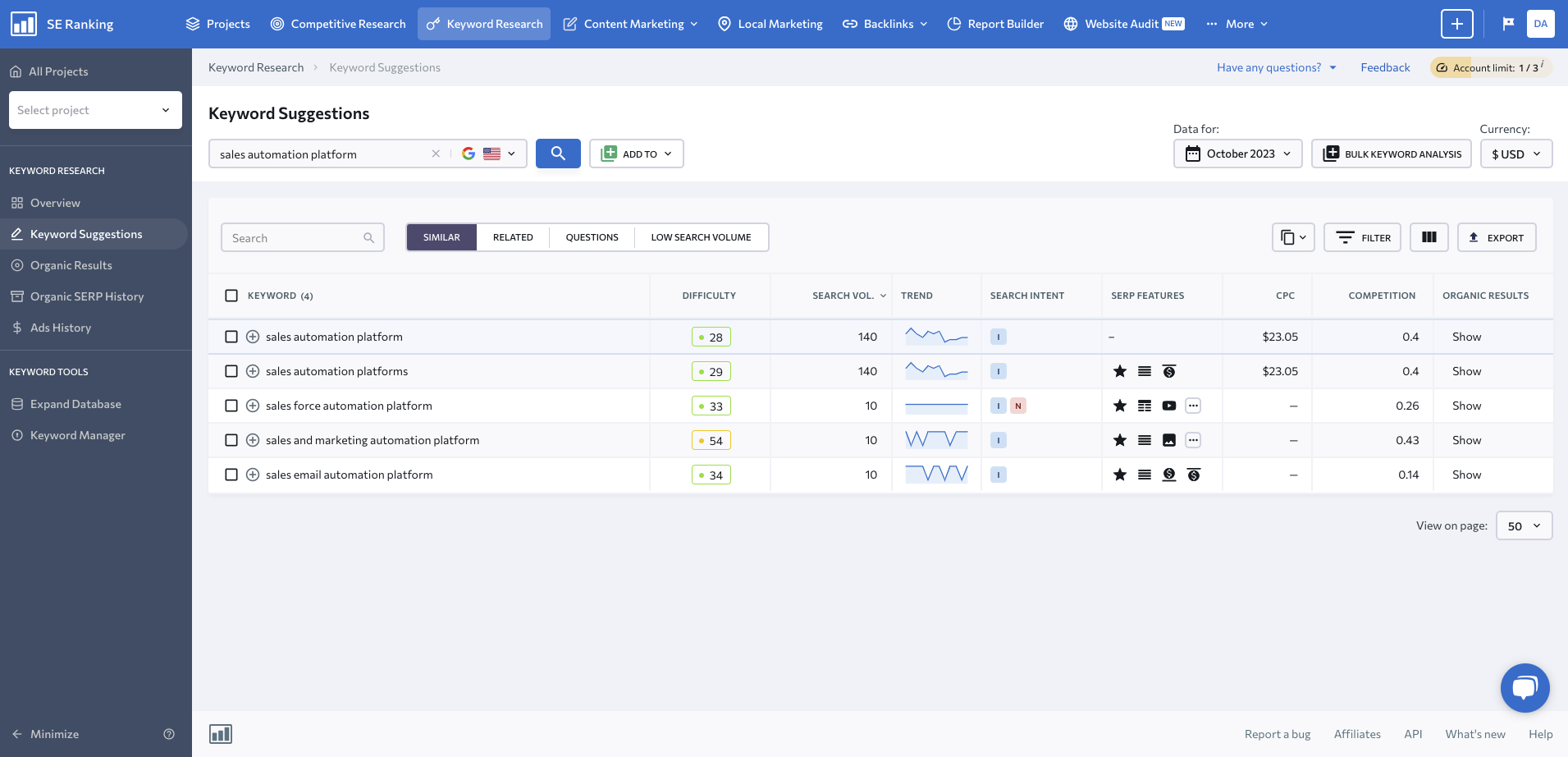LowFruits is a keyword research tool that uses Google Autocomplete to generate longtail keyword opportunities based on a seed topic you input. It highlights SERP weaknesses for each keyword opportunity, saving you time you would otherwise need to spend on manual SERP analysis.
LowFruits was founded in late 2020 by Paul Pilavachi, who wanted to make the process of keyword research based on analyzing SERP competition less frustrating. LowFruits was acquired in 2024 by AllInOneSEO which is brand in. Syed Balkhi’s portfolio of companies along with WpBeginner, OptinMonster, MonsterInsights and many others.
In this guide, we’ll take a look at LowFruits a little more in depth and provide you with a few alternatives to consider if you find it’s not for you.
Here’s the TL;DR version:
- LowFruits is designed to bulk analyze SERPs to find keywords that have weak spots you can target (such as sites with low domain authority, for example).
- LowFruits doesn’t have any reviews on popular sites like G2/Trustpilot at the time of writing this review. However, it’s received a decent amount of praise on X (Twitter).
- Major pain point: LowFruits requires you to spend a credit for every single keyword you want to analyze, which can quickly become expensive.
- Minor pain point: LowFruits is strictly a keyword research tool, and doesn’t come with extra features to help support your content creation.
- Our top recommendations for LowFruits alternatives are TopicRanker, RankAtom, RankIQ, AnswerThePublic, Keyword Chef, Mangools, and SE Ranking.
Our final verdict: LowFruits is a pretty good tool for finding keyword weaknesses in the SERP. It’s excellent for small publishers or marketers who don’t have much experience with SEO and finding good keyword opportunities. However, the per-credit pricing can be annoying and the tool is solely a keyword research tool.
TopicRanker is very similar to LowFruits, but its pricing model is more straightforward and it also comes with AI tools to help streamline your approach to content creation.
| Best Use Case | Biggest Drawback | Pricing | G2 Rating | |
| LowFruits | Bulk analyzing SERPs to find weak spots | Pricing for credits can get expensive | $29.90 – $79.90 per month or pay as you go | N/A |
| TopicRanker | Finding relevant, easy-to-rank keywords based on SERP weaknesses | New company that’s only around 1.5 years old | $14 – $129 per month | N/A |
| RankAtom | Generating long tail Google Autocomplete keywords with weak spots | Mediocre customer support | $39 – $199+ per month | 2 stars |
| RankIQ | Writing content that’s optimized for the best ranking potential | Keyword research not a major focus | $49 – $199 per month | 4.9 stars |
| AnswerThePublic | Discovering new search terms before your competition | Not as feature-rich as other tools on the market | $11 – $199 per month | 4.5 stars |
| Keyword Chef | Uncovering low competition keywords with real search intent | ONLY keyword research — no other SEO tools | $29 – $119 per month or pay as you go | N/A |
| Mangools | If you’re looking for a full suite of SEO tools | Data limitations | $49 – $129 per month | 4.6 stars |
| SE Ranking | SERP and backlink analysis | Data inconsistencies | $65 – $259 per month | 4.8 stars |
LowFruits Overview
LowFruits is a SEO keyword research platform that suggests keywords and bulk analyzes their respective SERPs. Here are the basics you need to know:
- LowFruits is designed to find keywords that have weak spots in the SERPs (like sites with low domain authority, for example).
- It works by analyzing keywords in bulk, clustering the ones that share similar intent, and highlighting SERP weaknesses such as low authority, title mismatch, and more.
- LowFruits doesn’t currently have any ratings on popular review sites like G2 and Trustpilot. However, it has received a lot of praise from SEOs, particularly on X (Twitter).
LowFruits Use Cases
Because LowFruits is focused on finding weak spots, it’s great at helping you squeeze your way into SERPs and even rank for more competitive terms if you exploit the weaknesses that exist in the ranking pages.
This makes it ideal for new sites who may have a difficult time ranking based on “keyword difficulty” alone, or for SEOs who want to save time by eliminating the need to manually analyze live SERPs.
LowFruits Drawbacks
LowFruits is overall a pretty solid tool with not a lot of cons. However, there are two minor drawbacks you should consider before signing up:
- Credit pricing can get expensive: You’ll have to use a credit for every keyword you want to analyze. If you run a really big content operation or just want to analyze a lot of different keywords, the cost can really start to add up.
- Small learning curve: LowFruits works differently than other popular keyword research tools, so it can take a bit of time to get used to the interface and understand the keyword opportunities provided.
LowFruits Pricing
LowFruits has monthly/annual subscription options or you can opt for pay-as-you-go pricing that’s based on number of credits used.
With pay-as-you-go pricing, you can purchase 2000, 5000, 10k, or 50k credits at a time. The more credits you purchase at once, the cheaper the per-credit pricing becomes:
- 2000 credits: $25
- 5000 credits: $60
- 10k credits: $100
- 50k credits: $250
Monthly/yearly plans come with additional features and you can also choose to purchase more monthly credits on top of your subscription if necessary.
- Standard (3000 credits/mo): $29.90 per month/$249 if paid annually
- Premium (10k credits/mo): $79.90 per month/$749 if paid annually
7 LowFruits Alternatives for SERP Analysis & Keyword Research
TopicRanker
Pricing: $14 – $129 per month
Best Use Case: Finding easy-to-rank keywords relevant to your site based on weaknesses in the SERPs
TopicRanker is similar to LowFruits in that it looks for weak spots in the SERP rather than suggesting keywords based on arbitrary keyword difficulty scores.
The founder of Backlinko described TopicRanker as “the future of keyword research.” It works by recommending easy-to-rank keywords you should target based on ultra-specific SERP issues, such as:
- Title mismatch — titles of pages missing terms from the search query
- Thin content — article has less than 1000 words
- High load time — page takes more than 3 seconds to load
- Outdated content
- Poor readability — reading level above 9th grade
- High spam score
- Poor mobile user experience
- Low authority sites
All of these weaknesses are indicators that a keyword is a golden opportunity if you can improve on them in your own content.
You can also use TopicRanker to identify improvements you can make for keywords you already rank for.
Here are another couple areas where TopicRanker really stands out from LowFruits:
- TopicRanker analyzes your site and current content into account, then creates a report with keywords that are both relevant to your niche and have weaknesses in the SERP.
- TopicRanker comes with a suite of AI writing tools to help you automate some of your content creation process. These tools include a title generator, meta description generator, and a content brief/outline generator.
RankAtom
Pricing: $39 – $199+ per month
Best Use Case: Generating long tail Google Autocomplete keywords with weak spots
G2 Rating: 2/5 stars (3 reviews)
RankAtom generates long tail keyword ideas from Google Autocomplete. You can also perform wildcard searches and filter keywords based on intent to find opportunities that are more relevant to your site.
RankAtom automatically performs SERP analysis when it suggests keywords so you don’t have to perform manual analysis for every potential keyword you’re thinking of targeting. It flags things like low domain authority, user-generated results (think Reddit and Quora), social media posts, and more.
It also has a rank tracking feature so you can keep up with your SERP positions for all the keywords you’re targeting and look at changes over time compared to your competitors.
| Businesses Like RankAtom For | Businesses Dislike RankAtom For |
|
|
RankIQ
Pricing: $49 – $199 per month
Best Use Case: Writing content that’s optimized for the best ranking potential
G2 Rating: 4.9/5 stars (532 reviews)
RankIQ is an SEO tool that’s designed with bloggers in mind. Its main features include a keyword library (which is a massive database of low-competition keywords sorted by niche), content optimizer and planner, and rankings audit. Here’s what the keyword library looks like when you’re searching for niche or industry:
The content optimizer feature analyzes the top-ranking pages for a specific keyword and gives you recommendations to help you create a piece of content that ranks higher.
An interesting feature is that it allows you to set monthly goals for your content creation and updates. This feature, combined with the rankings audit, makes it easy to track your content output and progress over time.
Overall, this tool isn’t really ideal if you want to look at a lot of keywords, but it solves a lot of other common problems that bloggers face and offers some unique features none of the other tools on this list do.
| Businesses Like RankIQ For | Businesses Dislike RankIQ For |
|
|
AnswerThePublic
Pricing: $11 – $199 per month
Best Use Case: Discovering new search terms before your competition
G2 Rating: 4.5/5 stars (36 reviews)
AnswerThePublic is a keyword research tool by NP Digital (Neil Patel) that discovers questions people are actually asking on Google and other search engines. It shows you questions people are asking, search volume and CPC data, and more. Below is an idea of what you’ll see when you enter a term. You can also download the graph image to your computer for later reference.
A big selling point of AnswerThePublic is its ability to tap into “never before seen” search queries that customers in your industry are starting to ask. If you can create content using these keyword terms before any of your competitors are, you’ll have an early ranking advantage while also solving a problem for potential customers that no one else is yet.
| Businesses Like AnswerThePublic For | Businesses Dislike AnswerThePublic For |
|
|
Keyword Chef
Pricing: $29 – $119 per month or pay as you go
Best Use Case: Uncovering low competition keywords with real search intent
G2 Rating: N/A
Keyword Chef is a keyword research tool that aims for quality over quantity when it comes to uncovering keyword opportunities. Specifically, it focuses on showing you highly targeted keyword opportunities that publishers can easily rank for.
Every keyword it suggests has real search intent and is categorized depending on what that intent is — for example, Questions, Best, and How-to are some of the search intent categories Keyword Chef sorts keywords into.
It automatically filters out “junk” keywords so you don’t have to wade through long lists of keyphrases that don’t actually make sense.
Keyword Chef also has some other useful features for publishers:
- Category generation: Keyword Chef can automatically generate a list of categories and subcategories for your site that will help build topical authority in your niche.
- Brand/merchant finder: Keyword Chef has a feature that helps you find popular brands in your niche that have affiliate programs or products you can promote to increase revenue on your site.
Mangools
Pricing: $49 – $129 per month
Best Use Case: If you’re looking for keyword research and a full suite of SEO tools
G2 Rating: 4.6/5 stars (72 reviews)
Mangools is a full suite of SEO tools, but the two that are most comparable to LowFruits are KWFinder and SERPChecker.
KWFinder is its keyword research tool. It’s pretty standard compared to other platforms that are used for traditional long tail keyword research. When you input a keyword term, you’ll see the top ranking articles for that term along with standard keyword metrics including search volume, keyword difficulty, CPC, and expected value.
SERPChecker is a tool for SERP analysis that helps you find competitor weak spots for a specified keyword. It points out weaknesses like low domain authority and page score, number of backlinks and referring domains, as well as things like social shares.
| Businesses Like Mangools For | Businesses Dislike Mangools For |
|
|
SE Ranking
Pricing: $65 – $259 per month
Best Use Case: SERP and backlink analysis
G2 Rating: 4.8/5 stars (1317 reviews)
SE Ranking is an all-in-one SEO tool for keyword research, competitor analysis, backlink monitoring, site audits, and more. It provides keyword suggestions based on content you’ve written and what content your competitors are writing.
When stacked up against LowFruits, SE Ranking really shines in a couple key areas:
- Backlink analysis: SE Ranking comes with backlink tools so you can keep tabs on the kinds of backlinks your competitors are acquiring and where they came from. You can also monitor your own backlink profile over time and keep an eye on new/lost links.
- Keyword rank tracker: This feature analyzes the top 100 search results for any keyword you input and then gives you information about the domains that are ranking.
| Businesses Like SE Ranking For | Businesses Dislike SE Ranking For |
|
|
Final Recommendations
To recap, here are our top recommendations if you’re looking for a LowFruits alternative:
- TopicRanker
- RankAtom
- RankIQ
- AnswerThePublic
- Keyword Chef
- Mangools
- SE Ranking
While LowFruits is a solid SEO tool for bloggers, the per-credit pricing model isn’t necessarily ideal for publishers who need to analyze large numbers of keywords each month. It’s also lacking features like backlink monitoring and site auditing that many of its competitors have.
We may be slightly biased, but we believe that TopicRanker is the best SEO tool for beginners and seasoned marketing professionals to invest in.
This is because TopicRanker takes almost all of the work out of keyword research, making the process nearly foolproof.
But as any SEO would know, keyword research is only one piece of the puzzle. Google’s recent updates have been cracking down on publishers, so it’s more important than ever that you’re focused on creating the most helpful content you possibly can.
This usually starts with competitor analysis and a content brief. With TopicRanker, you can automatically generate briefs and content outlines that will guide you and your writing team to create awesome content that ranks.
Check out how it works:





